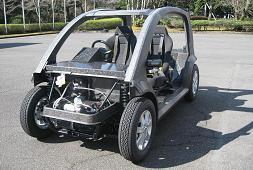Japanese company Teijin Limited has figured out a way to mass produce a mold for an automobile frame out of CFRP (Carbon fiber reinforced plastic) in under 60 seconds. Today’s conventional methods utilizes thermosetting resin and requires at least five minutes for molding. This length of time does not make it a good candidate for mass production, a large part of the reason CFRP has been limited to high-end vehicles.
Part of the way Teijin was able to do this was by impregnation carbon fiber with termoplastic resin:
By impregnating carbon fiber with thermoplastic resin, Teijin developed three intermediate materials for the production of CFRP suited for use in mass-production vehicles. The materials can be used selectively depending on the required strength and cost of the part, and they can be made with various thermoplastic resins, including polypropylene and polyamide. The new intermediate materials are as follows:
- Unidirectional intermediate: ultrahigh strength in a certain direction.
- Isotropic intermediate: optimum balance of shape flexibility and multidirectional strength.
- Long-fiber thermoplastic pellet: high-strength pellet made from carbon fiber, suited for injection molding of complex parts.
To demonstrate the technologies, Teijin has developed an EV concept car which has a cabin from made from thermoplastic CFRP. The frame weighs just 47 kilograms, which is about one fifth the weight of a conventional automobile cabin.

In addition the breakthrough in production technique, Teijin has also developed technologies for welding thermoplastic CFRP parts together, as well as bonding CFRP with materials such as steel.
[Source: Teijin]